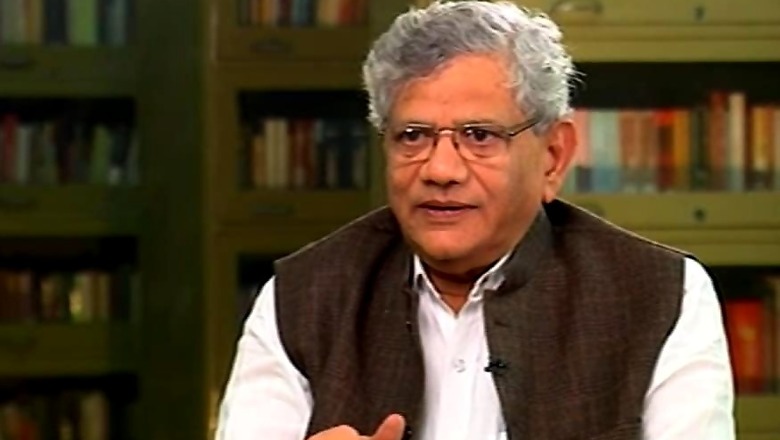
views
The 22nd CPM Congress that concluded in Hyderabad on Sunday re-elected incumbent Sitaram Yechury as general secretary and adopted the controversial political-tactical line that was voted out in January by the outgoing Central Committee populated by Karat camp hardliners. Though not exactly a Pyrrhic victory, his re-election was not without twists and turns and orchestrated personal attacks during discussion on political-tactical line and organisational report on Saturday and Sunday.
While Yechury managed majority in the newly constituted 94-member Central Committee, it remains to be seen whether he will be able to navigate freely in the new 17-member Politburo, which is evenly balanced between the two factions, to implement party’s policies and programmes.
Some of the Central Committee and Politburo members lobbied hard to get Yechury replaced with former Tripura chief minister Manik Sarkar as general secretary.
Central Committee member from Telengana S Veeraiah, a protege of BV Raghavulu, who is a pro-Karat PB member, proposed Sarkar as party chief in the acrimonious meeting. Three members from Andhra —S Punyavathi, wife of BV Raghavulu; CITU all India president K Hemalatha and her son R Arun Kumar — also opposed Yechury’s re-election. Another delegate, Mamatha, daughter in law of Hemalatha, attacked Yechury for the CPM-Congress alliance in West Bengal two years ago and demanded disciplinary action against him.
However, sensing the predominantly pro-Yechury mood among the 800-odd delegates Sarkar backed out from the contest.
Some hardliners from Kerala stooped a bit low in mounting a personal attack on Yechury. A former lawmaker from the state, sources said, likened Yechury to Mikhail Gorbachev (former Soviet President who ushered in Perestroika and Glasnost in the undivided country) implying that Yechury is out to harm the party interests.
Another comrade, miffed with his push for understanding with the Congress, slammed him as “opportunist” and even alleged that Yechury was nursing a grudge against the party for denying him another term in the Rajya Sabha. Another branded him as Kautsky, a derogative term for a revisionist who will “subordinate party interests to the Congress in the name of fighting the BJP’s fascism”.
However, by Saturday Yechury was able to turn the tables. The sense of the House (800-odd delegates) had changed in favour of his political-tactical line paving way for his re-election as party boss. The Congress adopted a crucial amendment incorporating his proposal calling for “understanding” with all secular-democratic forces, including the Congress, to form a broad anti-BJP coalition ahead of 2019.
Yechury should thank the BJP, in particular Prime Minister Narendra Modi and party president Amit Shah, for engendering the rabid anti-BJP mood in the Congress with their actions and pronouncements tilting the balance in favour Yechury line.
Many grass-root level comrades felt that the BJP dispensation headed by Modi-Shah duo betrayed “fascistic tendencies”, as articulated by Yechury last year as against Karat’s take that the BJP is “authoritarian”. Widespread unrest among farmers, Dalits and minorities due to religious polarisation buttressed Yechury’s assessment of Modi government and many delegates who viewed the BJP and the Congress as the two sides of the same coin began to rethink; from “anti-Congressism” the mood changed to strident “anti-BJPism” in the Hyderabad Congress.
Though Yechury won two major wars – getting his political line adopted by the Congress and getting re-elected as general secretary, he has a third barrier to cross – the Politburo.
Compared to the outgoing Central Committee and Politburo, in the new bodies Yechury’s influence, if not command, has increased. The numerical minority position had earlier enabled Karat camp to bulldoze every decision in the name of majority and the principle democratic centralism constricting Yechury’s manoeuvrability.
In the new Politburo, his supporters have swelled to 50 per cent compared to the one-third support base he had earlier and in the new Central Committee, he has, sources say, 60 per cent support.
However, in case of available Politburo, that often meet to clinch current and controversial issues Yechury support base will come down to 40 per cent and such a scenario could hamper smooth implementation of party’s policies and programmes. Sources said Yechury wanted to induct Ashok Dhawale, a popular Kisan leader from Maharashtra, who had successfully organised the farmers’ march that culminated in Mumbai, into the Politburo but Brinda Karat foiled his attempt.
Yechury could still face opposition to his bid to forge electoral understanding with the Congress. On Saturday, addressing the media Brinda Karat is reported to have said “any adjustment with the Congress is not permissible”. Her comments indicate that the hardliners, miffed at their losing the perception battle, may resort to semantics to dispute the interpretation of the political-tactical line adopted at Hyderabad.
(The author is a senior journalist and political commentator. Views are personal.)




















Comments
0 comment